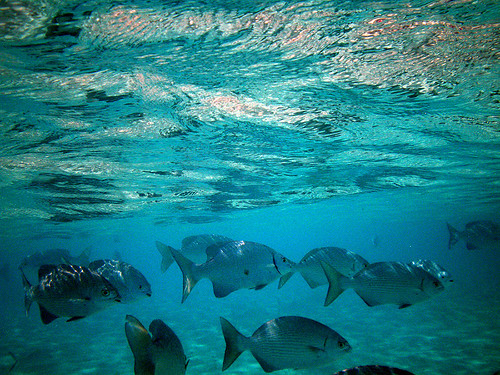This guest post is from RLMiller [Subscribe]who is becoming a strong and impassioned blogosphere voice on climate issues, serving the organizing role in the “Adopt a Senator” effort to track positions taken by Senators on climate issues and pressure them to adopt reality-based policy approaches.
The key take-way from this post: Do not lose sight of the importance of 350.
Earlier today, the government of Maldives held a cabinet meeting. The meeting was remarkable not for who attended — the President, cabinet ministers, and assorted staff — nor for what was said at the meeting, but where it was held. 
The meeting was set up underwater not to highlight the clear waters and snorkeling opportunities of the Maldives, but instead a lighter way to emphasize a very serious point: “We will die.”
Maldives is a country in the Indian Ocean, southwest of Sri Lanka, comprised of 1,190 atolls. It has the distinction of being both the lowest country on the planet, with an average height of 1.5 meters (under 5 feet), and the country with the lowest highest point in the world, at 2.3 meters (7 ft 7 inches). The capital island, Male (shown at right) is densely built on flat land.
Until the 1970s, the Maldives’ economy was best described as subsistence; meager agriculture compensated by abundant marine life, including cowries (shells prized in trading), tuna, rays, eels, and sharks. Then tourism discovered clear waters 
glorious sunsets

and curious fish

creating an island paradise

Maldives is considered among the world’s top spots for recreational diving. The country’s other water sports include swimming, fishing, scuba diving, snorkeling, water-skiing, windsurfing…and, possibly, adapting to life underwater.
Globally, seas are predicted to rise up to two meters (over 6 feet) by the end of the century, according to the September 2009 United Nations Environmental Programme Compendium, which updates the 2007 Nobel Prize-winning Intergovernmental Panel on Climate Change report.
Hence, an underwater cabinet meeting. At the meeting, President Mohammed Nasheed signed a declaration calling for concerted global action on climate change, ahead of the UN climate conference in Copenhagen. Nasheed, a former political prisoner of the prior regime who won a democratic election in 2008, knows what’s at stake for his country. He’s taking a pro-active stance by pledging to become the first completely carbon-neutral country by 2020, installing solar panels and wind turbines and slowly replacing gasoline-powered boats and cars with electric versions. Nasheed also plans to use tourism funds to purchase new land in India, Sri Lanka, and Australia for his country’s 300,000 people. Last month, he upstaged Barack Obama in New York by telling the United Nations:
If things go business as usual, we will not live. We will die. Our country will not exist.

1 response so far ↓
1 Xero Cool // Oct 23, 2009 at 12:44 am
If we don’t survive, we believe that in future other nations to save them selves would be very difficult, it’s like saving Poland in world war 2, cox it was an front line state in the war and when you loose you’re front line… then to bounce back would be very hard and difficult.